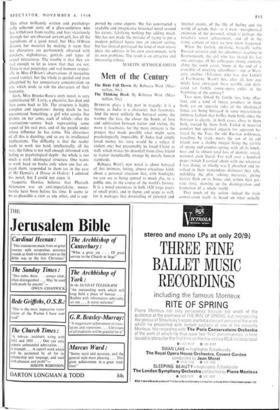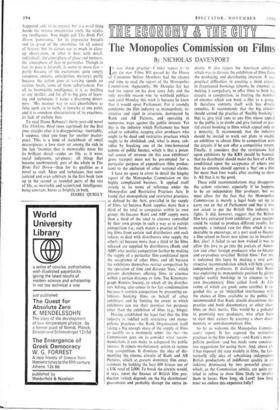Men of the Century
The Thinking Reed. By Rebecca West. (Mac- millan, 30s.)
BETRAYAL plays a big part in tragedy; it is a theme, as Judas is a character, that fascinates. And the more unlikely the betrayal seems, the warmer the kiss, the closer the bonds of love and admiration between traitor and victim, the more it fascinates, for the more intricate is the process that made possible what might seem psychologically impossible. If Judas had simply loved money his story would be a vulgar if violent one; but presumably he loved Christ as well, which makes his downfall from close friend to traitor inexplicably strange by merely human standards.
Rebecca West's new novel is about betrayal of this intimate, loving, almost circuitous kind; about a personal situation that, with hindsight, we can see as being central to much else, to a public one, to the course of the world's history. It is a novel enormous in bulk (428 large pages of small print), and in theme and scope as well, for it manages that dovetailing of external and internal events, of the life of feeling and the world of action, that—as it were—metaphorical extension of the personal, which is perhaps the novelist's rarest achievement; and all in the ironic context of what we now know happened.
When the foolish, idealistic, basically noble Russian terrorist ends his adventures teaching in Bournemouth, the girl who has shared his last one envis:q!es all his colleagues strung similarly along the south coast, 'mum at the end of a crocodile of mocking schoolboys'—one at West- gate, another ('Ulyanov, who was also Lenin') at Eastbourne. Wasn't this, after all, how one might have envisaged these terrible and dedi- cated yet faintly comic-opera exiles at the beginning of the century?
Two men, linked by family tics, long affec- tion, and a kind of innate goodness in them both, yet on opposite sides of the ideological fence, are being betrayed in some mysteriously intimate fashion that baffles them both, since the betrayer is clearly, in both cases, close to them both, trusted by them both. Exiled in material comfort but spiritual anguish for apparent be- trayal by the Tsar, the old Russian nobleman, travelling by train, meets the son of an old friend, now a shabby emigre living the rat-life of spying and counter-spying, with all its loneli- ness and its almost total loss of identity, social, national, even literal. For well over a hundred pages (which I carried about with me whatever I was doing, so wholly was I absorbed and in- volved in their tremendous dialogue) they talk, unfolding the plot, solving mysteries, giving history flesh on its bones and, within their pri- vate story, showing up the disintegration and formation of a whole world.
That much of the action—indeed the train conversation itself—is based on what actually happened adds to its interest, but is a small thing beside the intense imaginative truth, the vitalis- ing intelligence. You might call The Birds Fall Down 'panoramic,' for its impressive breadth and its grasp of the enormities (in all senses) of history; but its virtues are as much in close- up observation, in what it does with detail, individuals, the atmosphere of place and memory, the atmosphere of fear in particular. Though in fact its pace is leisurely, it seems to move fast— partly because of the excitement, quite simply (suspense, anxiety, anticipation, mystery), partly because the action goes at varying speeds on various levels, some of them subterranean. For all its formidable intelligence, it is as thrilling as any thriller; and for all its big guns of learn- ing and technique, it keeps a disarming direct- ness : 'His manner was to real cheerfulness as false teeth are to teeth,' it remarks at one point, and it is somehow characteristic of its exactness, its lack of stylistic fuss.
To read Dame Rebecca's thirty-year-old novel The Thinking Reed (now reprinted) for the first time straight after it is disappointing—inevitably, I suppose, since you hope for another master- piece. This is a kind of sketchbook of small masterpieces, a love story set among the rich in the late 'twenties that is memorable more for its brilliant detail—asides on life, as it were, social judgments, set-pieces: all things that become unobtrusively part of the whole in The Birds Fall Down—than for its qualities as a novel as such. Ideas and techniques that seem isolated and even arbitrary in the first book turn up in the second as rounded parts of the rest of life, as inevitable and assimilated. Intelligence, being constant, burns as brightly in both.
ISABEL QUIGLY



































 Previous page
Previous page